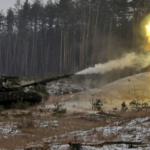Serbian Foreign Minister Marko Djuric has once again utilized a diplomatic platform to perpetuate his aggressive propaganda against Kosovo. In a recent meeting with Jan Braathu, the head of the OSCE mission in Serbia, Djuric emphasized the challenges Serbia faces concerning Kosovo, painting a bleak picture of the situation.
During the meeting, Djuric asserted that “one of the biggest challenges for Serbia is the situation in Kosovo, that there is no progress in normalizing relations,” and that “Serbs living there are exposed daily to pressures, discrimination, and various provocations.” These statements align with the narrative consistently propagated by Serbian officials, aiming to highlight alleged injustices faced by the Serbian minority in Kosovo.
Djuric’s rhetoric did not stop there. He reiterated the demagogic phrases often used by his leader, President Aleksandar Vučić, claiming that “Serbia remains committed to maintaining peace and stability in the region.” This statement is frequently employed by Serbian authorities to position themselves as the stabilizing force in the Balkans, despite ongoing tensions and conflicts.
In addition to his criticism of the situation in Kosovo, Djuric expressed Serbia’s gratitude for the assistance and support provided by the OSCE Mission over the years. He acknowledged the role of the Mission in implementing reforms in areas crucial for the further advancement of Serbia, particularly in the field of European integration. “Serbia is grateful for the OSCE’s long-standing support in helping us achieve necessary reforms,” Djuric stated, underscoring the importance of this partnership for Serbia’s aspirations towards European integration.
The meeting also covered broader topics, including the OSCE’s ongoing projects in Serbia and their impact on the country’s development. Djuric highlighted the positive contributions of these projects, noting that they have been instrumental in various sectors, from legal reforms to promoting human rights and democracy. He emphasized that continued support from international organizations like the OSCE is vital for Serbia’s progress.
However, the focus remained largely on Kosovo, with Djuric making it clear that Serbia sees the situation there as a significant obstacle to its stability and progress. He called for more international attention to be given to the plight of Serbs in Kosovo, urging the OSCE to play a more active role in addressing these issues.
The ministry’s statement following the meeting reflected Djuric’s sentiments, emphasizing Serbia’s commitment to peace and stability while also highlighting the challenges posed by the current situation in Kosovo. The statement reiterated the need for ongoing international support and cooperation to address these challenges effectively.
Djuric’s continued propaganda efforts underscore the deep-seated tensions between Serbia and Kosovo, as well as the complexities involved in achieving lasting peace and stability in the region. As Serbia navigates its path towards European integration, the resolution of its issues with Kosovo remains a critical and contentious issue. The international community’s role in mediating and supporting this process is more important than ever, as both sides work towards a peaceful and stable future.







